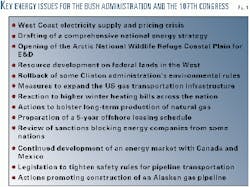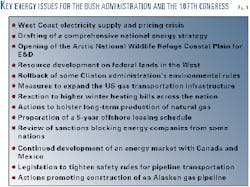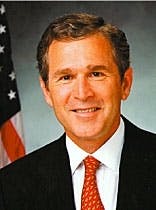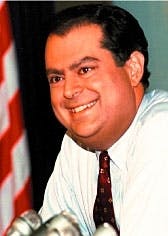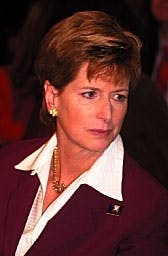US oil and gas industry has high expectations from Bush administration on energy issues
Like an audience anxious for a play to begin, the US oil and gas industry has high expectations for the Bush administration.
From industry's perspective, the casting of the lead roles couldn't be better. President George W. Bush is a one-time West Texas independent. In 1977, Bush founded Arbusto Energy Inc., which was merged into Harken Energy Corp. in 1986. Until being tapped as Bush's running mate, Vice-Pres. Richard Cheney was Halliburton Co. CEO and chairman. One of Bush's key advisors will be Don Evans, the Secretary of Commerce nominee, who was the long-time chairman and CEO of Tom Brown Inc., Midland, Tex.
Bush and Cheney face a number of challenging energy issues on the national stage, but they're working without a script.
California has plunged into a dark electricity crisis (see related story, p. 70). Natural gas prices are setting records that will have US homeowners paying 70% more for heating this winter. High gasoline and heating oil prices prompted consumer outrage last year and could again this year.
Farmers are cutting corn crops this spring because high natural gas prices have made energy for irrigation too expensive or the use of nitrogen-based fertilizer uneconomic.
And oil industry groups are clamoring for the government to develop a national energy policy that would encourage energy development.
Critics think Bush and Cheney are well-rehearsed for their roles, but they're less sure about the supporting cast-the new heads of the Energy and Interior departments and the Environmental Protection Agency.
And Congress also has a lot of actors making their debuts. All of the House committees have new chairmen. And although Republicans are in nominal control of the Senate, Democrats have equal billing on the committees. Overall, the congressional ensemble is narrowly divided between two political parties-each determined to upstage each other.
Critics wonder if Bush can better his father's performance of a dozen years ago. Industry had high hopes when the curtain lifted for the first Bush administration but afterwards gave it lackluster reviews.
Ironically, the younger Bush faces many of the same policy scenarios that challenged his father: security of energy supplies, development of a national energy policy, offshore drilling, the environmental quality of fuels, Alaskan exploration, sanctions against foreign nations, and pipeline safety.
Task force
In late January, Bush named Cheney to head a cabinet task force to develop a national energy policy.
He said, "I can't think of a better man to run it than the vice-president."
The task force also would include the secretaries of the Treasury, Energy, Commerce, Interior, Transportation, and Agriculture departments, as well as the Environmental Protection Agency administrator.
It was not disclosed when the task force would issue a report.
Bush said, "This is a matter of high concern for this administration, because it's a matter of high concern for our nation. It's becoming very clear to the country that demand is outstripping supply, that there are more users of electricity and natural gas than there is new units being found, and we've got to do something about that.
He said the task force would address issues such as high energy prices, reliance on foreign oil imports, and development of pipelines and power-generating capacity.
He said a key issue is, "How do we encourage conservation on the one hand, and bring more energy into the marketplace?"
He said the study would examine the electric power crisis in California. "We're very aware in this administration that the situation in California is beginning to affect neighboring states. If we don't find more energy supplies to meet growing demand in places like California, the consumer is going to pay a dear price."
But Bush stressed the California problem should be solved there. "It's now up to the people of California, the elected officials of California, to correct a flawed law, and we're encouraged that they're doing so."
White House Press Sec. Ari Fleischer said, "President Bush is determined to focus on a long-term solution, so that his successors and their successors will not be back in the same box that he is in today. We have inherited this energy crisis, this looming energy crisis. One of the reasons is (that) we did not have from the previous administration a long-term energy policy in place. President Bush's focus will indeed be long-term."
Objectives
Bush 's energy policy statements have remained consistent with the program he outlined in late September (OGJ, Oct. 9, 2000, p. 20) to reduce US dependence on oil imports.
The keystone measure would allow exploration on the coastal plain of the Arctic National Wildlife Refuge east of Prudhoe Bay oil field in Alaska. Revenues from ANWR would be used to fund several other energy initiatives, such as alternative fuels programs.
In addition to opening ANWR, Bush's administration would reexamine whether natural gas-prone areas of federal lands should be opened for exploration.
Bush has pledged that his administration would analyze all federal lands and evaluate if the potential energy resources justified the risk of development. However, Bush said there's no doubt development should not be allowed in some "pristine" or "sensitive" areas.
Bush said he would respect the wishes of California and Florida to not allow drilling off their coasts. His program would ease regulatory roadblocks to the construction of US refining capacity and require federal agencies to develop a comprehensive policy for approving pipelines.
He would expand the Low Income Home Energy Assistance Program for homeowners who cannot afford their fuel bills, using $1 billion over 10 years from increased federal oil and gas royalty income. Also, the federal weatherization program would be expanded, costing $1.4 billion over 10 years.
Other measures
Bush would continue operation of a Northeast distillate heating oil reserve established by former President Bill Clinton. Unlike Clinton, Bush would draw down crude from the Strategic Petroleum Reserve only in times of war or major supply disruptions.
He proposed a North American energy alliance with Canada and Mexico and diplomatic initiatives to oil-producing nations of the Persian Gulf.
Bush plans to strengthen energy ties with Mexico, the world's sixth-largest oil producer and not a member of the Organization of Petroleum Exporting Countries.
"The quickest way to have impact on the energy situation is for us to work with Mexico, and a certain extent Canada, to build a policy for the hemisphere," he said.
His administration would promote development of energy resources in areas outside of OPEC, such as the Caspian Sea region and western and southern Africa. And it would hold an annual meeting of G-8 (Group of Eight) energy ministers to encourage international energy cooperation.
The Bush administration would continue funding of "clean coal" research, encourage operation of nuclear generating plants, expedite the relicensing of hydroelectric projects, and push for federal legislation restructuring the electric utility industry.
Bush would establish a Royalties Conservation Fund, earmarking "potentially billions in royalties from new oil and gas exploration in ANWR to fund conservation efforts." It would earmark a possible $1.2 billion in bid bonuses from an ANWR lease sale for the funding of alternative energy research.
And it would support tax credits for electricity produced from renewable and alternative fuels at a cost of $1.4 billion over 10 years.
ANWR issue
Bush said recently there's "ellipseno question about the fact that the ANWR will be a part of a longer-term (energy) strategy."
Industry has been concerned, for much of the past 6 months, that Clinton might declare the 1.5 million acre coastal plain a national monument in order to prevent development.
After it became apparent that Bush had won the election, environmentalists pressured the White House for such an action, arguing that the administration should give the area monument protection so that Congress could not open it to drilling.
But former Interior Sec. Bruce Babbitt and Clinton decided that the monument designation would not add any protection that ANWR doesn't have under existing law.
Clinton did urge Congress to resist allowing oil drilling in "one of the last truly wild places on earth."
At the request of Congress, the National Research Council has begun a study of the effects of the environmental impacts of development at Prudhoe Bay field. The report is expected in July 2002 and should have a bearing on the ANWR debate.
Bush spokesman Ari Fleischer has predicted Congress will approve Bush's proposal to permit exploration. "We think we can get it through. It's a small sliver of ANWR. With new technologies, it can be developed in a very environmentally sensitive fashion. And people are increasingly realizing that the alternative is to have an excessive reliance on foreign supplies of oil and paying higher and higher prices for both natural gas and oil."
ANWR is just half of the administration's arctic energy strategy (see related article, p. 74). The other half is Bush's desire to promote construction of a pipeline to bring gas from Prudhoe Bay field to the Lower 48 states.
Sen. Frank Murkowski (R-Alas.) said recently, "Prudhoe Bay field has 36 tcf. "Nobody paid much attention to it before because of the cost of getting that gas out when gas was $2.16/Mcf, which is what it was a year ago.
"Now gas is $8.40/Mcf. And as we look at the fact that we're pulling down (US gas) reserves, there is more and more thought given to marketing that gas."
The state obviously is anxious to see construction of a $10 billion gas pipeline. As Murkowski noted, it would be "the largest single construction project in the history of this nation."
Policy draft
Energy Sec. nominee Spencer Abraham is expected to play a key role in the administration's development of an energy strategy.
When he named Abraham to the post, Bush indicated the secretary would fulfill the campaign pledge to draft "a comprehensive energy policy for our country." Bush added that policy would stress the development of natural gas reserves on federal lands.
Abraham, until recently a Republican senator from Michigan, elaborated at his confirmation hearings before the Senate energy committee.
He said the administration would propose a broad and balanced national energy plan, incorporating electricity deregulation, conservation, and incentives for crude oil production and renewable energy, all with the goal of reducing the nation's dependence on oil imports. He said the administration would cooperate with Congress in the preparation of the plan.
Pointing to the nation's increasing dependence on foreign oil-more than 57% now, compared with only 36% during the oil crisis of the 1970s-and to the booming demand for energy, Abraham said the economy is "directly linked to assuring adequate supplies of reasonably priced energy."
He avoided direct statements about opening more public lands for oil and gas drilling or means to increase production
Senators on the committee recommended Abraham attempt an interagency approach to energy issues-involving the Energy and Interior departments and EPA-a concept Abraham said he fully supported.
Abraham gave few hints about what action Bush planned to take to address the power shortage in California that has pushed two major utilities to the brink of bankruptcy and left homes and businesses suffering blackouts.
"I am very concerned with developments in California," he told the panel, adding the electricity crisis would be a priority issue in for the administration.
As a senator, Abraham had cosponsored legislation that would have dismantled the Department of Energy and moved most of its functions to other agencies.
During his confirmation hearing, though, he said because of recent developments such as the passage of the National Nuclear Security Administration Act and the deepening energy crisis, "I no longer support this legislation and its various components, such as the privatization of the federal power marketing administrations."
Shifts at EPA
New Jersey Gov. Christie Whitman, selected to be EPA administrator, had a smooth confirmation hearing before the Senate environment and public works committee.
She said states should be given more latitude in meeting federal pollution control rules, all regulations should be subjected to a strict cost-benefit analysis, and the EPA should drop its "command-and-control" attitude toward environmental protection.
Whitman said the Bush administration would review EPA's rule last December to require cleaner-burning diesel engines and a 97% reduction in the sulfur content of highway diesel fuel, to 15 ppm from 500 ppm.
EPA had said the diesel engine rule "would provide the cleanest-running heavy-duty trucks and buses in history. These vehicles will be 95% cleaner than today's trucks and buses." And it said the action would slash particulate emissions from cars and trucks nearly 110,000 tons/year.
The standards would be phased in for engine manufacturers during 2007-10. The fuel provisions are effective June 2006.
Although EPA claimed the rule would increase diesel fuel costs only 4-5¢/gal, refiners disagreed. They complained the rule, coming atop other recent fuel improvements, was unreasonable.
The American Petroleum Institute said this challenge "is exacerbated because refiners cannot begin taking action to reduce on-road diesel sulfur until the sulfur limit for the other part of the diesel market-off-road is known." It explained that refiners make both kinds of diesel in the same process.
Interior choices
Former Colorado Atty. Gen. Gale Norton, named to head the Department of the Interior, drew vociferous opposition from environmental groups.
A former Libertarian, Norton began her career as a lawyer with the Mountain States Legal Foundation, a conservative law firm headed by former Interior Sec. James Watt.
Norton was elected in 1990 as Colorado's first female attorney general, but due to statutory term limits, had to retire in 1998. She has now been approved by the Senate and is the first female Interior Secretary.
At her confirmation hearing, she pledged that, during her tenure, "Our nation's environmental laws and laws for the protection of natural resources will be fully enforced." She added, "I will be candid in telling you that I am both a conservative and a conservationist. I see no conflict there."
Norton pledged more involvement in the implementation of federal lands policies for landowners and private companies. She said, "The goal of preserving lands is worthwhile. The process is one that causes me concern."
Regarding general energy policy, she said, "The issue of Americans being so dependent on foreign oil, is obviously, a great cause for concern. We will have to pull together all our our resources and work across departmental lines to find ways of addressing those issues. Obviously, it's going to be difficult to find short-term answers. We'll have to do a lot of planning to be able to find long-term answers."
Rollbacks
President Bush has said his administration plans to look at "every single issue, every single opportunity" to reverse government rules and decisions made late in the Clinton administration.
In its final days, the Clinton administration hurried to finalize several long-pending environmental rules, such as stricter energy efficiency standards for appliances, the diesel sulfur rule, and a US Forest Service action to ban new roads on some 60 million acres of national forests.
Bush said, "What I would seek to do is to make sure that our bureaucracies were not trampling the interest of the people. There ought to be a balance between [what is] obviously the public interest and private property. And a lot of people in my state and in the Western states feel that balance is not there."
Clinton took a similar action when he took office, placing a moratorium on the issuance of pending rules by the earlier Bush administration and reviewing executive orders and last-minute regulations.
It would be difficult to overturn rules that have gone through the administrative process and have been issued in final form. The process to reverse a rule is the same as that to issue one and could take 2-3 years.
But Rep. James Hansen (R-Utah), the new House resources committee chairman, has noted that the 1996 Congressional Review Act gives that body 60 legislative days to review and overturn some presidential acts.
In a joint letter to Bush and Cheney, Hansen listed several Clinton-era regulations that should be scaled back. They included a Minerals Management Service rule revising royalty payment calculations for federal leases.
Industry's push
Oil and gas industry associations, concerned about limitations on their ability to produce and transport energy, have been clamoring for a national energy strategy.
Electricity groups are divided on decontrol issues but mostly agree on the need for transmission reform.
Red Cavaney, API president, recently noted that it has become increasingly difficult for US oil companies to meet the demand of consumers for readily available and affordable products such as gasoline, heating oil, and natural gas because "energy has not been an overriding government priority for some time."
Cavaney said the retail price spikes and tight supplies in some markets, such as the Upper Midwest, during 2000 showed the nation is "beginning to pay the price for this lack of policy realism. If we continue on the course we're on, the negative impacts will be increasingly exacerbated and consumers increasingly inconvenienced."
He said that technology has given the industry the ability to produce abundant oil and natural gas supplies in an environmentally friendly way, but the federal government's "patchwork" of uncoordinated regulations often work against the goal of ensuring a reliable supply of affordable energy.
"These government requirements are an important reason why we are producing less crude oil and importing more-about 57% of total demand this past year-and why we are running our refineries flat out, yet importing large amounts of finished products."
Cavaney said it is time for the government to establish energy priorities within a national energy policy that would sustain economic growth and create new jobs, new wealth, and new quality-of-life improvements. "Our nation's economic well-being is unalterably tied to our energy supply."
API and other groups have been drafting a list of legislative proposals the administration should consider.
Other associations also are making similar statements. The Interstate Oil and Gas Compact Commission passed a resolution in December urging the next Congress and the president to develop an energy strategy that increases industry's access to public lands for gas production.
The National Ocean Industries Association said that, because of current and projected energy shortages, MMS should consider offering areas in the next 5-year offshore leasing program that have been omitted in recent years.
And the National Association of Manufacturers is drafting policy recommendations for the 107th Congress, including a chapter on energy policy. It said, "Technology has made it possible for the US to develop more of its substantial domestic energy resources-coal, oil, and natural gas-in conjunction with protecting the environment. Our current regulatory regime fails to recognize this and excessively limits their domestic development and use."
The US Chamber of Commerce is concerned about economic sanctions against other nations that prohibit US energy companies from competing for business. The Iran-Libya Sanctions Act is due to expire in August, and efforts to reauthorize it are expected to open a general debate on sanctions.
In a recent advertisement, ExxonMobil Corp. said "Unilateral economic sanctions are rarely effective but do discourage development of non-US energy supplies that would add to global supply diversity. Thus, sanctions policies are ripe for revision."
US President - George W. Bush
There is no question that the Arctic National Wildlife Refuge Coastal Plain will be part of a longer-term energy strategy.
US Energy Sec. - Spencer Abraham
The Bush administration would propose a broad and balanced national energy plan that incorporates electricity deregulation, conservation, and incentives for crude oil production and renewable energy, all with the goal of reducing the nation's dependence on oil imports.
US EPA Administrator - Christie Whitman
States should be given more latitude in meeting federal pollution control rules, all regulations should be subjected to a strict cost-benefit analysis, and the EPA should drop its "command-and-control" attitude toward environmental protection. Photo by S.C. Delaney
US Interior Sec. - Gale Norton
"The goal of preserving lands is worthwhile. The process is one that causes me concernellipseThe issue of Americans being so dependent on foreign oil is, obviously, a great cause for concern. We will have to pull together all of our resources and work across departmental lines to find ways of addressing those issues."
